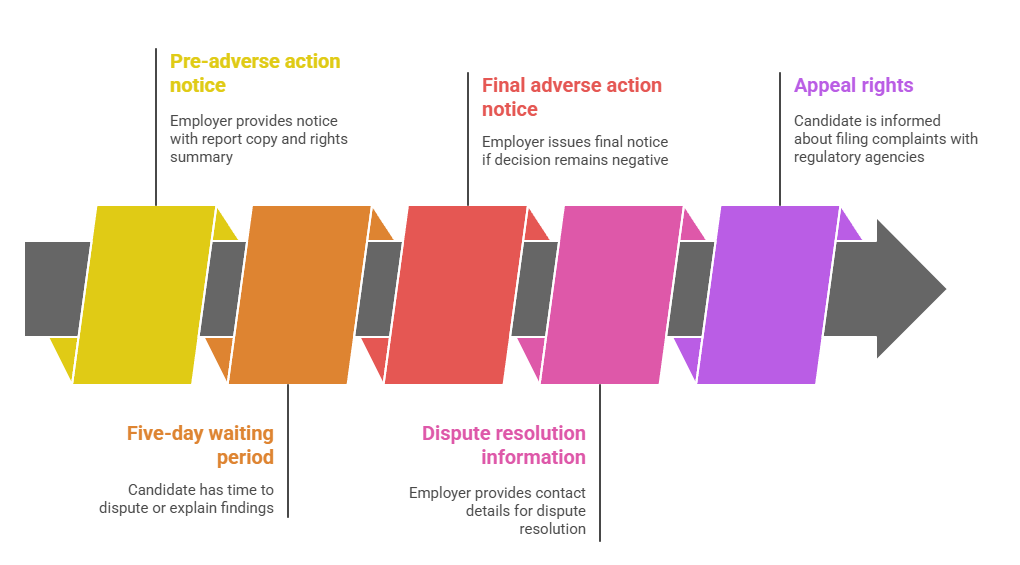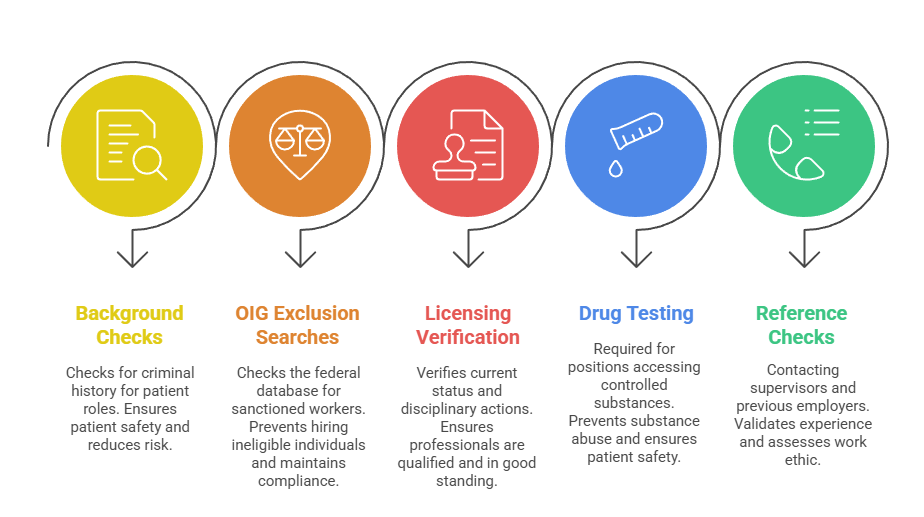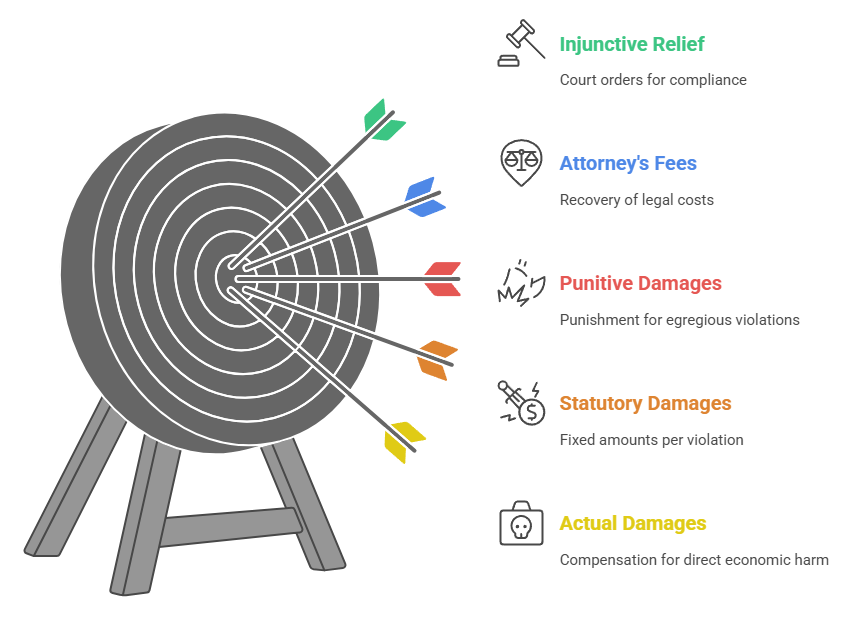California's pre-employment screening laws are among the most comprehensive in the United States, requiring strict compliance with the Fair Chance Act, Ban the Box regulations, and Investigative Consumer Reporting Agencies Act (ICRAA). Employers must navigate complex timing restrictions, disclosure requirements, and individualized assessment protocols while job seekers gain significant protections against discriminatory hiring practices.
Key Takeaways
- California's Fair Chance Act prohibits most employers from conducting criminal background checks until after a conditional job offer is made.
- The state's Ban the Box law eliminates criminal history questions from initial job applications for most positions.
- ICRAA requires specific disclosures and waiting periods before employers can obtain consumer reports for employment purposes.
- Background check processing times in California typically range from 2-10 business days, depending on the scope and verification requirements.
- Employers must conduct individualized assessments considering job relevance, time elapsed, and rehabilitation evidence before making adverse decisions.
- Job seekers have enhanced rights to dispute inaccurate information and receive copies of all background check reports used in hiring decisions.
Understanding California's Pre-Employment Screening Landscape
California's employment screening requirements represent the most restrictive regulatory environment in the United States. The state has implemented multiple overlapping laws designed to protect job seekers while allowing employers to make informed hiring decisions. These regulations significantly impact how background checks, credit reports, and other screening tools can be used during the hiring process.
The primary legislation governing pre employment screening california includes the Investigative Consumer Reporting Agencies Act (ICRAA), the Fair Chance Act (also known as California's Ban the Box law), and various anti-discrimination statutes. Additionally, many California municipalities have enacted their own screening ordinances. These local laws may impose additional restrictions beyond state requirements.
For job seekers, understanding these protections is crucial for recognizing when potential employers may be violating their rights. HR professionals and employers must ensure full compliance to avoid costly litigation and regulatory penalties. These penalties can reach six figures per violation, making compliance a critical business priority.
California Background Check Laws: Prohibited and Permitted Practices

California background check laws establish clear boundaries around what information employers can request and when they can obtain it. The state prohibits employers from asking about criminal history on initial job applications, with limited exceptions for specific industries like healthcare and financial services. Additionally, employers cannot consider arrests that did not result in conviction, marijuana-related convictions more than two years old, or convictions that have been sealed or dismissed.
Conversely, employers may verify employment history, education credentials, and professional licenses after making conditional offers. They can also conduct reference checks and skills assessments throughout the hiring process. However, salary history inquiries remain prohibited regardless of timing.
The california background check laws also restrict when and how employers can use credit reports. These reports are only permitted for positions involving significant financial responsibility or fiduciary duties. Similarly, social media screening must comply with privacy laws and cannot target protected characteristics or activities.
Timing Restrictions and Conditional Offer Requirements
The Fair Chance Act california mandates that most employers wait until after extending a conditional job offer before conducting criminal background checks. This "ban the box" approach ensures that qualified candidates receive initial consideration based on their skills and experience rather than their criminal history. However, the law includes specific exceptions for positions where federal or state regulations require earlier screening.
Once a conditional offer is made, employers must follow a structured process that includes providing specific disclosures, allowing time for candidate response, and conducting individualized assessments. The entire process typically adds 5-14 days to the hiring timeline, depending on the complexity of the background check and any disputes that arise.
Prohibited Information and Lookback Periods
California maintains strict rules about what background information employers cannot consider during the hiring process. The state prohibits inquiry into arrest records that did not result in conviction, even if charges are still pending in some cases. Furthermore, employers cannot access sealed, dismissed, or expunged records under any circumstances.
| Information Type | Lookback Period | Permitted Use |
| Criminal Convictions | 7 years for most positions | Only after conditional offer |
| Credit Reports | 7 years | Financial positions only |
| Driving Records | 7 years | Driving-related roles only |
| Marijuana Convictions | 2 years maximum | Prohibited after lookback |
| Arrest Records | Never | Completely prohibited |
The lookback periods apply differently depending on the position's salary level and responsibilities. Positions paying over $125,000 annually may have extended lookback periods for certain types of screening.
The Fair Chance Act: Ban the Box Implementation
The Fair Chance Act represents California's most significant employment screening reform in decades. This comprehensive legislation applies to employers with five or more employees and covers most private sector positions. The law establishes a multi-step process that prioritizes rehabilitation and job relevance over blanket exclusions based on criminal history.
Under the Act, employers must remove questions about criminal history from job applications and initial interviews. They cannot conduct background checks until after making a conditional employment offer. Once they discover potentially disqualifying information, employers must follow specific procedures before making final decisions.
The legislation requires employers to conduct individualized assessments that consider multiple factors. These include the nature and gravity of the offense, the time elapsed since conviction, and the nature of the job being sought. Employers must also consider evidence of rehabilitation, including education, training, employment history, and community involvement since the conviction occurred.
Individualized Assessment Requirements
When criminal history is discovered, the fair chance act california requires employers to evaluate each case individually rather than applying blanket exclusion policies. The assessment must consider the relationship between the criminal conduct and the specific job duties. For example, a theft conviction may be relevant for a cashier position but irrelevant for a landscaping role.
Employers must also weigh the time that has passed since the conviction occurred. Generally, older convictions carry less weight in employment decisions, particularly when candidates can demonstrate positive life changes. The assessment should include consideration of the candidate's age at the time of the offense and their behavior since then.
Notice and Response Procedures
When an employer intends to make an adverse hiring decision based on criminal history, they must provide the candidate with a written preliminary decision notice. This notice must include a copy of the conviction history report and an explanation of the candidate's right to respond. The candidate then has five business days to submit evidence challenging the accuracy of the report or providing additional context about their rehabilitation.
During the response period, candidates can submit character references, certificates of rehabilitation, evidence of community service, or documentation of educational achievements. Employers must consider all timely submitted information before making their final decision. If they proceed with the adverse decision, they must provide a final notice explaining their reasoning and the candidate's right to file a complaint with appropriate agencies.
ICRAA Compliance: Consumer Reporting Requirements
The Investigative Consumer Reporting Agencies Act (ICRAA) governs how employers obtain and use consumer reports for employment screening california purposes. This law requires employers to provide specific disclosures before ordering background checks and obtain written authorization from candidates. The disclosure must be clear, conspicuous, and separate from other employment documents.
ICRAA mandates a three-day waiting period between providing disclosure and obtaining the consumer report, except in specific circumstances. This cooling-off period allows candidates to understand their rights and prepare for potential issues that may arise during the screening process. The waiting period can be waived only in cases of immediate business necessity, which employers must document thoroughly.
The Act also requires employers to provide candidates with additional rights notices and information about the screening process. These notices must explain how the information will be used, the candidate's right to dispute inaccuracies, and contact information for the screening company. Employers who fail to follow these procedures face significant legal liability.
Disclosure and Authorization Procedures
ICRAA requires employers to provide comprehensive disclosures before conducting any type of background screening. The disclosure must be presented as a standalone document, not buried within employment applications or other forms. It must clearly state that a consumer report may be obtained and used for employment purposes.
The authorization form must be separate from the disclosure and cannot include liability waivers or other unrelated agreements. Candidates must have adequate time to review both documents before signing. Electronic signatures are permitted but must comply with specific technical and procedural requirements.
Adverse Action Procedures Under ICRAA
When employers discover information that may lead to an adverse employment decision, ICRAA requires a detailed notice process. Candidates must receive a copy of the consumer report, a summary of their rights under state and federal law, and information about how to dispute inaccurate information. The process includes multiple waiting periods designed to ensure candidates have adequate time to respond to concerning findings.

- Pre-adverse action notice: Must include report copy and rights summary
- Five-day waiting period: Allows candidate time to dispute or explain findings
- Final adverse action notice: Required if employer proceeds with negative decision
- Dispute resolution information: Contact details for screening company and reporting agencies
- Appeal rights: Information about filing complaints with regulatory agencies
The law also grants candidates broad rights to access information about screening decisions. They can request copies of all reports obtained and receive detailed explanations of how the information influenced the hiring decision.
Background Check Processing Times and Factors
Background check timelines in California often exceed national averages due to the state's enhanced procedural requirements and disclosure mandates. The ICRAA three-day waiting period, Fair Chance Act response periods, and potential dispute resolution processes can extend the overall screening timeline significantly. Most employment screening california processes now require 10-15 business days or longer in complex cases.
Several factors commonly delay background check processing in California. Incomplete candidate information requires additional verification steps. Common names may trigger false positive matches that need manual review. Out-of-state records often require direct contact with courts and agencies that don't participate in automated databases.
Additionally, California's disclosure requirements mean that candidates receive more detailed information about their background checks. This transparency sometimes leads to disputes or requests for additional information. While these processes protect candidate rights, they can extend hiring timelines considerably.
Standard Processing Timeframes by Check Type
Different types of background checks have varying processing times in California. Criminal history searches typically take 2-5 business days but can extend longer if manual court research is required. Employment verification depends heavily on former employer responsiveness and can range from 3-10 business days.
| Check Type | Standard Timeline | Complex Timeline | Common Delays |
| Criminal History | 2-5 business days | 7-14 business days | Court backlogs, name variations |
| Employment Verification | 3-7 business days | 10-15 business days | Unresponsive employers, defunct companies |
| Education Verification | 1-3 business days | 5-10 business days | Foreign institutions, old records |
| Professional Licenses | 1-2 business days | 3-5 business days | License board delays, name changes |
| Reference Checks | 2-5 business days | 7-10 business days | Contact availability, detailed requirements |
Professional license verification usually processes quickly through automated databases. However, references and employment verification can take considerably longer, especially for candidates with extensive work histories or international backgrounds.
Expedited Processing Options and Limitations
Some screening companies offer expedited processing for urgent hiring needs, but California's mandatory waiting periods limit how much timelines can be compressed. The ICRAA three-day disclosure period cannot be waived except in documented emergency situations. Similarly, Fair Chance Act response periods are fixed by law.
Employers can minimize delays by ensuring they collect complete and accurate candidate information upfront. Providing middle names, previous addresses, and employment dates reduces the likelihood of false matches or verification delays. However, rushing the process increases the risk of compliance violations and legal liability.
Industry-Specific Screening Requirements and Exemptions
Certain industries in California face additional screening requirements that may override general Ban the Box protections. Healthcare employers must comply with federal and state background check mandates that require pre-offer screening for positions involving patient care. These requirements include database searches for sanctions, exclusions, and disciplinary actions.
Financial services companies must meet federal requirements for positions with access to sensitive financial information or decision-making authority. The Bank Secrecy Act and other regulations mandate specific screening procedures that occur before conditional offers. Similarly, insurance companies must comply with state Department of Insurance screening requirements.
Transportation companies, particularly those involved in interstate commerce, must follow federal Department of Transportation screening requirements. These include pre-employment drug testing, driving record checks, and criminal background screening with specific disqualifying offenses. The screening must occur before employees can perform safety-sensitive functions.
Healthcare and Patient Care Positions
Healthcare employment screening california requirements are among the most comprehensive in any industry. Positions involving direct patient care or access to controlled substances require extensive background checks before employment begins. These checks include criminal history, healthcare sanctions databases, and professional license verification.

- Criminal background checks: Required for all patient-facing roles
- OIG exclusion searches: Federal database of sanctioned healthcare workers
- State licensing verification: Current status and disciplinary history
- Drug testing: Required for positions with controlled substance access
- Reference checks: Clinical supervisors and previous healthcare employers
Healthcare employers must also conduct ongoing monitoring of employee backgrounds. This includes periodic re-screening and immediate notification when employees face criminal charges or professional sanctions.
Financial Services and Fiduciary Roles
Financial services employers have broader latitude to conduct pre-offer screening due to federal regulatory requirements. Positions involving customer funds, investment advice, or financial decision-making authority require comprehensive background checks before employment begins. These roles are explicitly exempt from Fair Chance Act timing restrictions.
The screening process for financial positions typically includes credit reports, criminal background checks, regulatory database searches, and employment verification. Certain convictions, such as financial crimes or fraud, may be permanently disqualifying for these positions. However, employers must still conduct individualized assessments where state law requires them.
Rights and Protections for Job Seekers
California provides extensive rights for job seekers throughout the background screening process. These protections begin with the right to know when screening will occur and what information will be gathered. Candidates must receive clear disclosures about the screening process and their rights under state and federal law.
During the screening process, job seekers have the right to timely completion of background checks and prompt notification of any concerning findings. They can request copies of all reports obtained and challenge inaccurate or incomplete information. If errors are discovered, screening companies must investigate and provide corrected reports to employers.
Job seekers also have the right to provide additional context about their background during Fair Chance Act response periods. This includes submitting character references, rehabilitation evidence, or explanations of extenuating circumstances. Employers must consider all timely submitted information before making final decisions.
Dispute Resolution and Record Correction Processes
California law provides extensive rights for job seekers to challenge inaccurate background check information and seek corrections to their records. Candidates can dispute information directly with the screening company, request investigations into questionable findings, and provide additional context about their background and rehabilitation efforts. The dispute process must begin within five business days of receiving a preliminary adverse decision notice.
Screening companies must complete investigations within 30 days and provide written results to both the candidate and employer. If the investigation reveals inaccuracies, the screening company must provide corrected reports to all employers who received the original information within the past two years. This broad correction requirement helps prevent ongoing employment impacts from erroneous information.
Legal Remedies and Enforcement Options
Job seekers who experience violations of California's employment screening california laws have multiple avenues for legal recourse. They can file complaints with the California Department of Fair Employment and Housing, which has authority to investigate and prosecute screening violations. The department can issue monetary penalties and require policy changes to prevent future violations.
Private civil litigation represents another significant enforcement mechanism. Job seekers can sue employers and screening companies for damages resulting from legal violations. Available remedies include actual damages such as lost wages and benefits, statutory damages ranging from hundreds to thousands of dollars per violation, and punitive damages for willful misconduct.

- Actual damages: Lost wages, benefits, and other economic harm directly caused by violations
- Statutory damages: Fixed amounts set by law, typically $100-$5,000 per violation depending on the specific law violated
- Punitive damages: Additional compensation designed to punish particularly egregious violations and deter future misconduct
- Attorney's fees: Recovery of legal costs in successful cases, encouraging private enforcement of screening laws
- Injunctive relief: Court orders requiring specific compliance actions or prohibiting continued violations
The potential for significant financial liability creates strong incentives for employers to maintain strict compliance with all applicable screening requirements. Class action lawsuits can result in multi-million dollar settlements when employers systematically violate screening laws.
Best Practices for Employers and HR Professionals

Successful compliance with California's complex screening requirements demands systematic approaches and regular training updates. Employers should establish written policies that clearly outline their screening procedures, timing requirements, and decision-making criteria. These policies should be regularly reviewed and updated to reflect legislative changes and emerging court decisions.
Training programs for hiring managers must emphasize the importance of consistent application of screening policies and the legal risks associated with deviations from established procedures. Documentation requirements under California law are extensive, requiring employers to maintain detailed records of their screening decisions and the factors that influenced those determinations.
Regular audits of screening practices help identify potential compliance gaps before they result in legal liability. These audits should examine both the procedures used and the outcomes achieved to ensure that screening practices do not result in disparate impact on protected classes or systematic exclusion of qualified candidates.
Policy Development and Implementation
Effective screening policies must address each stage of the hiring process from job posting through final decision-making. The policy should specify when different types of screening can occur, what disclosures are required, and how adverse information should be evaluated. Clear guidelines help ensure consistent application across different hiring managers and departments.
The policy must also establish procedures for handling disputes, corrections, and candidate responses during the screening process. This includes designating specific staff members to manage screening communications and establishing timelines for internal decision-making. Regular policy updates ensure compliance with changing legal requirements.
Training and Documentation Requirements
All staff involved in hiring decisions need comprehensive training on California screening laws and company policies. Training should cover both the legal requirements and practical implementation challenges. Regular refresher training helps staff stay current with legal changes and reinforces proper procedures.
Documentation requirements extend beyond simply keeping copies of background check reports. Employers must document their decision-making process, including how they considered rehabilitation evidence and job-relatedness factors. These records may be crucial evidence in defending against discrimination claims or regulatory investigations.
Recent Legislative Updates and 2025 Changes
California continues to refine and expand its employment screening protections with new legislation and regulatory guidance. Recent updates have clarified implementation requirements under existing laws and expanded protections for specific types of information. Employers must stay current with these changes to maintain compliance.
The 2025 legislative session has brought additional clarity to individualized assessment requirements under the Fair Chance Act. New guidance specifies what types of evidence employers must consider and how they should document their decision-making process. These updates provide better protection for job seekers while giving employers clearer compliance standards.
Additionally, several California cities have enacted local screening ordinances that go beyond state requirements. Los Angeles, San Francisco, and other major cities have implemented additional waiting periods, expanded prohibited information, and enhanced enforcement mechanisms. Employers operating in multiple jurisdictions must navigate these overlapping requirements carefully.
Emerging Compliance Challenges
Technology advances in background screening present new compliance challenges for California employers. Artificial intelligence and automated decision-making tools must be carefully evaluated to ensure they don't systematically exclude protected classes or violate individualized assessment requirements. The use of social media screening and online reputation checks raises additional privacy and discrimination concerns.
Remote work and gig economy employment models also create compliance complications. Employers must determine how screening requirements apply to contractors, remote employees, and workers who may perform duties across multiple jurisdictions. These evolving work arrangements require flexible compliance strategies.
Enforcement Trends and Regulatory Focus
California enforcement agencies have increased their focus on employment screening violations in recent years. The Department of Fair Employment and Housing has launched targeted investigations of employers in high-violation industries and published enforcement guidance on screening requirements. These investigations often result in significant penalties and mandatory policy changes.
Private litigation has also increased substantially, with specialized plaintiff's attorneys filing class action lawsuits against employers with systematic screening violations. These cases often result in substantial settlements and ongoing court supervision of employer screening practices. The threat of litigation has made compliance a critical business priority for California employers.
Conclusion
California's pre-employment screening requirements continue to evolve, with 2025 bringing additional clarity to implementation requirements and expanded protections for job seekers. The state's comprehensive approach balances legitimate employer screening needs with strong anti-discrimination protections and rehabilitation-focused policies. Employers must invest in robust compliance systems and regular training to navigate this complex landscape successfully. Job seekers benefit from understanding their rights and available remedies when screening violations occur, making informed advocacy an essential part of the employment process.
Frequently Asked Questions
What background checks are legal in California for employers?
California employers can conduct criminal background checks, but only after making a conditional job offer in most cases. They can verify employment history, education credentials, and professional licenses throughout the hiring process. However, they cannot ask about salary history, conduct credit checks except for specific financial positions, or consider arrest records that didn't result in conviction. The screening must comply with ICRAA disclosure requirements and Fair Chance Act timing restrictions.
How long do California background checks take to complete?
California background checks typically take 2-10 business days to complete, depending on the scope of screening required. The ICRAA three-day waiting period, potential Fair Chance Act response times, and dispute resolution processes can extend the total timeline to 10-15 business days in complex cases. Criminal history checks usually take 2-5 days, while employment verification can take 3-7 days depending on former employer responsiveness.
What is the Fair Chance Act in California?
The Fair Chance Act is California's Ban the Box law that prohibits most employers from asking about criminal history until after making a conditional job offer. It requires employers to conduct individualized assessments of criminal history considering job relevance, time elapsed, and rehabilitation evidence. The law applies to employers with five or more employees and provides candidates with response periods to explain their background before adverse decisions are made.
Can California employers ask about criminal history on job applications?
No, California employers with five or more employees generally cannot ask about criminal history on initial job applications or during early interview stages. They must wait until after extending a conditional job offer, with limited exceptions for positions in healthcare, finance, and other regulated industries that have federal or state screening requirements. This "ban the box" approach ensures initial consideration based on qualifications rather than criminal history.
What are the penalties for violating California background check laws?
Violations of California screening laws can result in regulatory penalties, private civil litigation, and damages including lost wages, statutory damages ranging from hundreds to thousands of dollars per violation, punitive damages, and attorney's fees. Individual violations can result in penalties ranging from hundreds to thousands of dollars, with potential class action liability reaching six figures or more. Enforcement agencies can also require policy changes and ongoing compliance monitoring.
How can job seekers dispute inaccurate background check information in California?
Job seekers can dispute inaccurate information directly with the screening company within five business days of receiving a preliminary adverse decision notice. They can request investigations, provide additional documentation about their background, and submit character references or rehabilitation evidence. California law requires screening companies to investigate disputes within 30 days and provide corrected reports to employers if errors are found.
Additional Resources
Still have questions?
Get in touch with our team today for a personalized demo and discover how our tailored volume pricing and packages can drive results for your business!
How useful was this page?*
Note: your comments are anonymous. We use them to improve the website. Do not include any personal details.
Visit our FCRA Compliance Tool or leave a message here if you need a response.
From the blog Explore the GCheck Content Hub

How Long Does a Background Check Take? A Complete 2025 Guide
13 Dec, 2023 • 14 min read
The Ultimate Background Check Guide
13 Dec, 2023 • 4 min read
The Ultimate Guide to Employment Background Checks
13 Dec, 2023 • 10 min readThe information provided in this article is for general informational and educational purposes only and should not be construed as legal advice or a substitute for consultation with qualified legal counsel. While we strive to ensure accuracy, employment screening laws and regulations—including but not limited to the Fair Credit Reporting Act (FCRA), Equal Employment Opportunity Commission (EEOC) guidelines, state and local ban-the-box laws, industry-specific requirements, and other applicable federal, state, and local statutes—are subject to frequent changes, varying interpretations, and jurisdiction-specific applications that may affect their implementation in your organization. Employers and screening decision-makers are solely responsible for ensuring their background check policies, procedures, and practices comply with all applicable laws and regulations relevant to their specific industry, location, and circumstances. We strongly recommend consulting with qualified employment law attorneys and compliance professionals before making hiring, tenant screening, or other decisions based on background check information.

